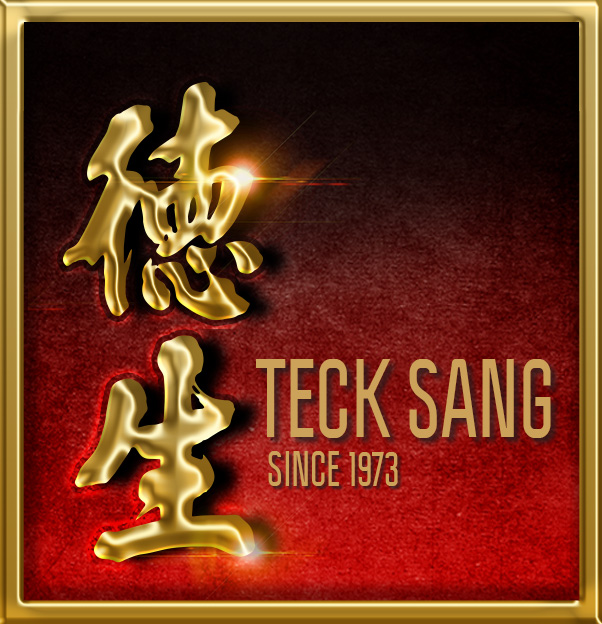The Complete List of Traditional Chinese Medicine Herbs and Spices
Discover the potent and natural realm of Traditional Chinese Medicine (TCM) herbs and spices. They enhance well-being and promote holistic health.
Key herbs include Ginseng and Astragalus, which boost energy. Licorice Root supports the immune system. Angelica Root benefits women's health.
Goji Berries, Honeysuckle Flower, and Jujube Seed improve vigor, skin health, and sleep quality. Mimosa Tree Bark and Red Ginseng provide emotional balance and cognitive function.
Each herb offers distinct advantages, strengthening your health comprehensively. Immerse yourself in this ancient practice to revolutionize your daily regimen. These proven herbs unlock secrets to invigorating benefits.
Key Takeaways
Benefits of Key Traditional Chinese Medicine Herbs and Spices
- Ginseng boosts vitality, immunity, stamina, reduces stress, and enhances cognitive function.
- Astragalus strengthens the immune system, acts as an antioxidant, boosts energy, and reduces inflammation.
- Licorice Root harmonizes herbs, regulates Qi, alleviates coughs, and supports adrenal health.
- Angelica Root nourishes blood, promotes circulation, and addresses menstrual irregularities.
- Goji Berries improve vision, nourish liver and kidneys, and support blood circulation.
Key Herbs and Spices in Traditional Chinese Medicine
Incorporating key herbs like Ginseng, Astragalus, Licorice Root, Angelica Root, and Goji Berries into your daily routine can transform your health.
These powerful ingredients, used for centuries in Traditional Chinese Medicine, offer benefits like boosting your immune system, enhancing energy, and promoting overall well-being.
Explore these natural remedies to support your body's balance and vitality.
Name (Chinese Name) |
Benefit Properties |
Image |
Astragalus (黄芪, Huángqí) |
Astragalus strengthens the immune system and acts as an antioxidant. |  |
Angelica Root (当归, Dāngguī) |
Angelica Root nourishes the blood and promotes circulation. | 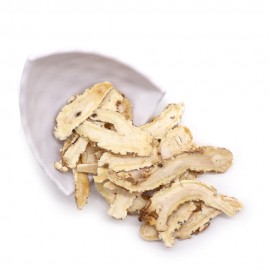 |
Bai Zhu (白术, Báizhú) |
Bai Zhu tonifies the spleen and promotes digestive health. It offers many benefits, including fatigue relief, improved appetite, and a stronger immune system. | 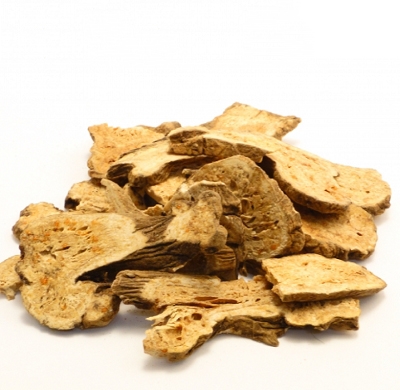 |
Codonopsis (党参, Dǎngshēn) |
Codonopsis is often used to help improve digestion, increase energy levels, and strengthen the immune system | 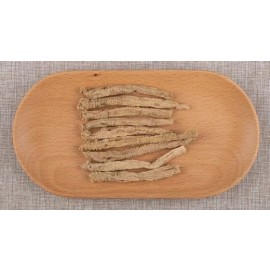 |
Cordyceps (冬虫夏草, Dōngchóngxiàcǎo) |
Cordyceps combats fatigue and enhances respiratory function and athletic performance. | 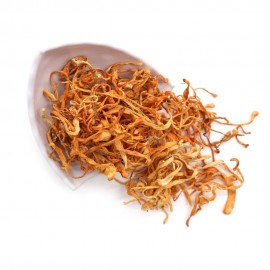 |
Chinese Hawthorn (山楂, Shānzhā) |
Chinese Hawthorn (Shānzhā) enhances digestion and alleviates food stagnation | |
Ginseng (人参, Rénshēn) |
The benefits of ginseng include improved stamina, reduced stress, and enhanced cognitive function. | 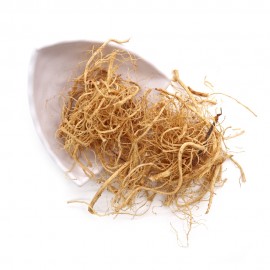 |
Goji Berries (枸杞子, Gǒuqǐzi) |
Goji Berries contain abundance of vitamins and minerals, which enhance immunity and overall health | 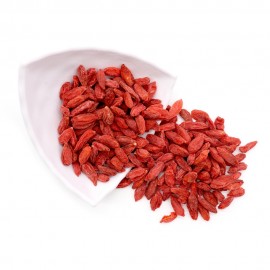 |
Honeysuckle Flower (金银花, Jin Yin Hua) |
Honeysuckle Flowers treats fevers, sore throats, and skin infections effectively | 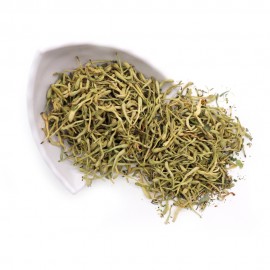 |
Jujube Seed ( 酸枣仁, Suan Zao Ren) |
Jujube Seeds, also known as Chinese Red Dates, are excellent in promoting sleep and stress relief. | 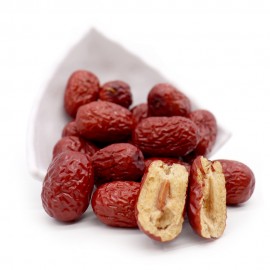 |
Licorice Root (甘草, Gāncǎo) |
Licorice Root alleviates coughs, soothes sore throats, and reduces inflammation | 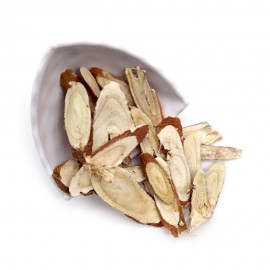 |
Mimosa Tree Bark ( 合欢皮, He Huan Pi) |
Mimosa Tree Bark helps individuals achieve emotional balance and anxiety relief. | |
Red Ginseng Root (人参, Ren Shen) |
Red Ginseng Root (Ren Shen, 人参) offers a natural way to boost energy, | |
Reishi Mushroom (灵芝, Língzhī) |
Lingzhi contains immune-boosting and anti-inflammatory properties. Reishi benefits your overall health by reducing stress, improving sleep quality, and enhancing mental clarity | 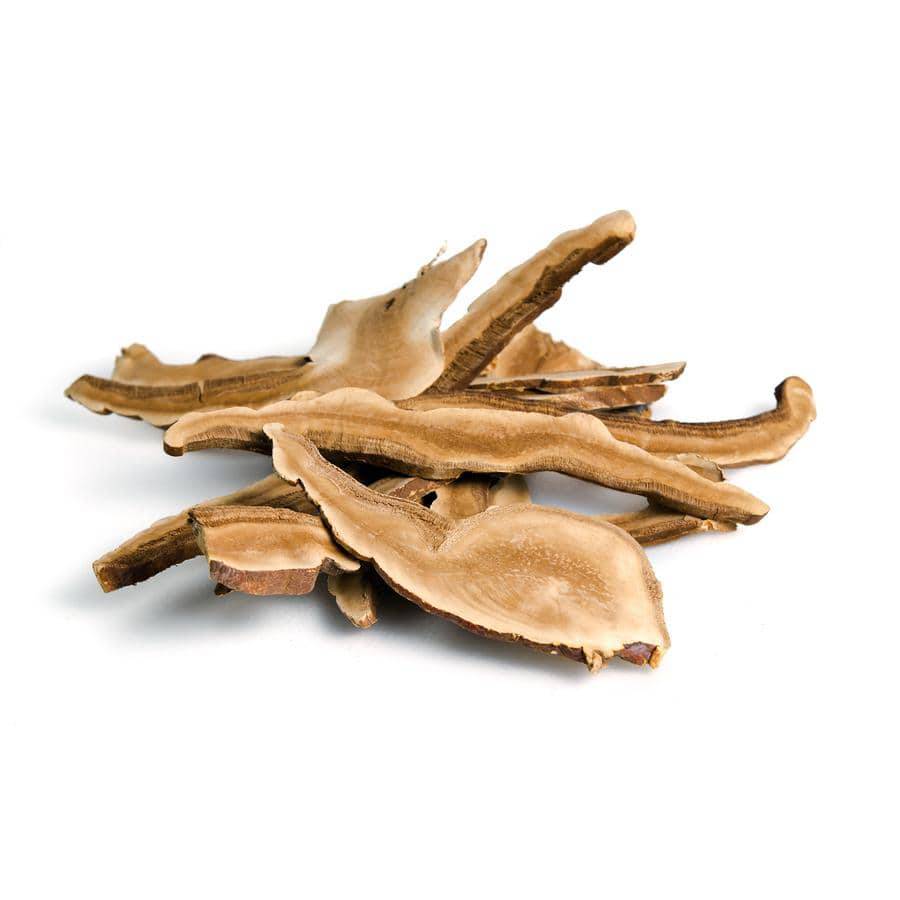 |
Schisandra Berry (五味子, Wǔwèizǐ) |
Schisandra Berries support liver health, boosts immunity, and enhances mental clarity. |
Angelica Root (当归, Dāngguī)
Angelica Root, known as Dāngguī in Chinese, nourishes the blood and promotes circulation. It serves as a cornerstone herb in Traditional Chinese Medicine. Angelica Root addresses menstrual irregularities, eases menopausal symptoms, and aids postpartum recovery. You can include it in recipes like soups and teas to harness its healing properties.
Potential side effects of Angelica Root include increased sensitivity to sunlight and digestive issues. Research highlights its anti-inflammatory and antioxidant effects, due to its rich composition of essential oils, ferulic acid, and coumarins.
Incorporate Angelica Root into your routine to experience its profound impact on overall health and well-being.
Astragalus (黄芪, Huángqí)
Astragalus, known as Huángqí in Traditional Chinese Medicine, strengthens the immune system and acts as a powerful antioxidant.
Daily use of this herb boosts energy and enhances overall well-being. Astragalus fortifies the body's defenses, making it more effective at fighting off illnesses. Its antioxidant properties reduce oxidative stress, crucial for cellular health.
This herb also alleviates inflammation, promoting comfort and general health. Increased energy levels from Astragalus help you feel more invigorated and less fatigued.
Integrate Astragalus into your wellness routine to support your body's natural defenses.
Bai Zhu (白术, Báizhú)
Explore Bai Zhu (白术, Bái Zhú), a key herb in Traditional Chinese Medicine. It tonifies the spleen and promotes digestive health. Bai Zhu offers many benefits, including fatigue relief, improved appetite, and a stronger immune system. You can add Bai Zhu to soups and herbal teas.
For dosage, professional guidance is vital, typically around 6-15 grams daily. Watch for side effects like nausea or dry mouth if overused. Research continues to reveal Bai Zhu's potential, highlighting its role in boosting energy and enhancing nutrient absorption.
- Supports spleen health
- Enhances digestion
- Boosts energy levels
- Strengthens immunity
- Improves nutrient absorption
Chinese Hawthorn (山楂, Shānzhā)
Chinese Hawthorn (Shānzhā) enhances digestion and alleviates food stagnation. This herb's digestive benefits ease that uncomfortable feeling after a heavy meal.
Rich in antioxidants, Chinese Hawthorn protects your cells from damage. It offers cardiovascular support and promotes healthy heart function.
For those watching their blood sugar, this herb may help regulate it. It also aids in weight management, helping you maintain a healthy weight.
With its sour and slightly sweet taste, incorporating Chinese Hawthorn into your daily routine can be both delicious and beneficial. Try it and feel the difference!
Codonopsis (党参, Dǎngshēn)
Codonopsis is a herb commonly used in Traditional Chinese Medicine (TCM) known for its immune-boosting properties. It is believed to tonify the Qi (vital energy) and nourish the spleen and lungs. Codonopsis is often used to help improve digestion, increase energy levels, and strengthen the immune system. In TCM, it is considered a gentle tonic that can be used over an extended period of time to support overall health and well-being.
Cordyceps (冬虫夏草, Dōngchóngxiàcǎo)
Cordyceps, known as 'winter worm summer grass,' stands as a prized medicinal fungus in Traditional Chinese Medicine. It boosts energy and supports kidney health. This fungus enhances respiratory function and athletic performance. Traditionally, Cordyceps combats fatigue, weakness, and respiratory issues.
Modern cultivation methods help conserve wild populations while providing health benefits. Research highlights its antioxidant, anti-inflammatory, and immune-modulating properties. Incorporating Cordyceps into your routine can improve vitality and overall well-being.
Embrace this powerful herb to experience its full health potential today.
Ginseng (人参, Rénshēn)
Ginseng, known as Rénshēn in Chinese, holds a prominent place in Traditional Chinese Medicine for its adaptogenic properties that enhance vitality and boost immunity. The benefits of ginseng include improved stamina, reduced stress, and enhanced cognitive function.
Many people turn to ginseng supplements to harness these advantages, but adhering to the recommended dosage is crucial to avoid side effects. Ginseng tea offers a soothing method to consume this potent herb.
Whether you aim to combat fatigue or sharpen mental acuity, incorporating ginseng into your daily routine can be highly beneficial. Always consult a healthcare provider to customize the right approach for your needs.
Goji Berries (枸杞子, Gǒuqǐzi)
Goji berries, or 'Gouqizi,' hold a prominent place in Traditional Chinese Medicine due to their rich antioxidant properties and extensive health benefits. They contain an abundance of vitamins and minerals, which enhance immunity and overall health. Enjoy these berries raw, dried, or in teas and soups to add a sweet and slightly tangy flavor.
- Goji Berry Benefits: They improve vision, nourish the liver and kidneys, and support blood circulation.
- Culinary Uses: Add goji berries to teas, soups, smoothies, or sprinkle them on salads for added flavor and nutrition.
- Recipes: Try making goji berry oatmeal or goji-infused herbal tea for a healthy twist.
- Growing Tips: Plant goji berries in well-drained soil with plenty of sunlight to ensure optimal growth.
- Supplements: Goji berries are available in capsules, powders, and extracts for easy integration into your daily routine.
Honeysuckle Flower (金银花, Jin Yin Hua)
Honeysuckle Flower (Jin Yin Hua) is known for its potent anti-inflammatory and antiviral properties. In Traditional Chinese Medicine, it treats fevers, sore throats, and skin infections effectively. Rich in antioxidants, Jin Yin Hua detoxifies your body and boosts your immune system.
Its sweet, slightly bitter taste suits teas, soups, and even desserts. You can also find it in various skincare products. Additionally, growing Jin Yin Hua in your garden is easy.
- Jin Yin Hua benefits: Supports immunity, fights infections, and detoxifies.
- Jin Yin Hua recipes: Add to soups, teas, and desserts.
- Jin Yin Hua tea: Brew for a soothing, health-boosting drink.
- Jin Yin Hua skincare: Use in masks and creams for clear skin.
- Jin Yin Hua cultivation: Easy to grow in your garden.
Jujube Seed ( 酸枣仁, Suan Zao Ren)
Harness the natural sedative properties of Jujube Seed (Suan Zao Ren, 酸枣仁) to combat insomnia and achieve deeper relaxation. This herb offers excellent sleep support, making it a popular choice for stress relief and as a reliable insomnia aid.
It soothes the nervous system, helping you unwind and promoting a sense of calm. The relaxation benefits go beyond improving sleep; it enhances overall well-being. Incorporating Jujube Seed into your routine can help you fall asleep more easily and stay asleep longer.
Embrace this natural remedy to transform your nights and wake up feeling refreshed and rejuvenated.
Mimosa Tree Bark ( 合欢皮, He Huan Pi)
Mimosa Tree Bark, known as He Huan Pi, holds a significant place in Traditional Chinese Medicine for its ability to enhance emotional well-being and reduce anxiety. Referred to as 'happy bark,' this herb helps individuals achieve emotional balance.
He Huan Pi offers a natural remedy for anxiety relief and mood enhancement. In traditional Chinese practices, it supports mental health through holistic approaches. Incorporating this bark into your routine can improve mood regulation and overall emotional well-being.
Whether dealing with stress or simply seeking to boost your mood, Mimosa Tree Bark provides a trusted, gentle solution in line with traditional Chinese medicine principles.
Licorice Root (甘草, Gāncǎo)
Licorice root, known as Gāncǎo in Traditional Chinese Medicine (TCM), harmonizes other herbs and regulates Qi. This root alleviates coughs, soothes sore throats, and reduces inflammation. It balances TCM formulas and supports adrenal health.
Be aware of licorice root side effects, such as high blood pressure and edema, especially with excessive consumption. Follow the recommended dosage of 1.5 to 9 grams daily. Avoid long-term use and consult a healthcare provider to prevent complications.
Red Ginseng Root (人参, Ren Shen)
Red Ginseng Root (Ren Shen, 人参) offers a natural way to boost energy and overall health. This potent herb, used in Traditional Chinese Medicine, provides numerous benefits:
- Skin rejuvenation: Boosts collagen production for a youthful appearance.
- Immune support: Strengthens the body's defenses against illnesses.
- Energy boost: Increases vitality and stamina naturally.
- Metabolism aid: Aids digestion and reduces bloating.
- Anti-inflammatory benefits: Lowers inflammation, promoting overall health.
Incorporate Red Ginseng into your routine for better health and increased energy.
Reishi Mushroom (灵芝, Língzhī)
Reishi Mushroom, known as Lingzhi in Chinese, stands out in Traditional Chinese Medicine for its remarkable immune-boosting and anti-inflammatory properties. Reishi benefits your overall health by reducing stress, improving sleep quality, and enhancing mental clarity.
Lingzhi's properties are legendary, believed to promote longevity and vitality while balancing your body's systems. You can consume Reishi in various forms, such as teas, powders, capsules, and tinctures, making it easy to integrate into your daily routine.
Traditional medicine applications of Lingzhi include supporting immune function and reducing inflammation, contributing to holistic wellness. Embrace this powerful adaptogen to experience its profound health effects and elevate your well-being.
Schisandra Berry (五味子, Wǔwèizǐ)
Schisandra Berry, or Wuweizi, stands out in Traditional Chinese Medicine for its unique blend of all five tastes and its potent health-enhancing properties. This remarkable berry supports liver health, boosts immunity, and enhances mental clarity.
Traditional uses in TCM include promoting healthy skin and increasing energy levels. Modern kitchens now incorporate Wuweizi in recipes ranging from teas to smoothies, leveraging its distinctive taste.
- Adaptogenic properties: Helps the body handle stress.
- Immune support: Boosts the immune system.
- Liver health: Supports liver function.
- Mental clarity: Enhances focus and cognitive performance.
- Versatile uses: Appears in both traditional and modern culinary applications.
Categories of TCM Herbs and Spices
Traditional Chinese Medicine (TCM) herbs and spices fall into several distinct categories. These include adaptogens, tonics, digestive aids, blood nourishers, and calming agents.
Adaptogens boost resilience to stress. Tonics enhance overall vitality. Digestive aids improve digestion. Blood nourishers support blood health. Calming agents promote relaxation.
Understanding these categories helps you make informed health choices, harnessing TCM's ancient wisdom for modern wellness.
Adaptogens
Incorporating adaptogens into your daily routine enhances your body's ability to manage stress and maintain balance. Adaptogens offer numerous benefits, including stress regulation, immune system reinforcement, vitality boost, and cognitive clarity improvement.
These powerful herbs help your body adapt to stress, promoting resilience and equilibrium. Ren Shen (Red Ginseng) and Huang Qi (Astragalus) are renowned in Traditional Chinese Medicine for their remarkable effects. They elevate energy levels, strengthen the immune system, and keep the mind alert.
- Adaptogen benefits: Enhance overall well-being
- Stress regulation: Regulate your body's stress response
- Immune reinforcement: Strengthen your immune system
- Vitality boost: Increase vigor and stamina
- Cognitive clarity improvement: Improve focus and cognitive function
Tonics
Tonics in Traditional Chinese Medicine nourish and strengthen your body's systems. Potent herbs like ginseng and goji berries offer enhanced energy levels and improved immune function.
You can easily incorporate these into your diet through recipes like herbal teas and soups. Tonic preparation is simple: just steep or simmer the herbs to unlock their full potential.
Regular consumption helps balance your Qi, Blood, Yin, and Yang, promoting overall vitality. For variety, try alternatives like reishi mushrooms and astragalus.
Digestive Aids
After nourishing your body with tonics, support your digestive health with TCM herbs and spices. These herbal blends enhance digestion, relieve bloating, and support metabolism. Incorporate TCM herbs to improve overall well-being and enjoy a more comfortable digestive experience.
- Codonopsis Root and Astragalus Root promote digestive health.
- Jujube Seed alleviates bloating and discomfort.
- White Peony Root boosts metabolism.
- Herbal blends like Daily Digestion soothe your stomach.
- Fast Forward blends optimize overall well-being.
Blood Nourishers
Blood nourishing herbs in traditional Chinese medicine replenish and improve blood quality and circulation. If you're dealing with blood deficiency or seeking anemia treatment, these herbs can make a significant difference.
Herbs like Dang Gui, Shu Di Huang, and Bai Shao often combine into potent herbal formulas. They offer a holistic approach to health. By enhancing circulation, these herbs combat fatigue and weakness, boosting overall health.
Their natural properties make them essential in TCM practices. They ensure your body gets the nourishment it needs. E
Calming Agents
Incorporating calming agents from Traditional Chinese Medicine can reduce stress and promote relaxation. These herbs support your nervous system and foster emotional balance. They also enhance cognitive function, helping you stay focused and sharp. By using these natural remedies, you can achieve better mental and emotional well-being. Calming ingredients include Jujubes and Mimosa Tree Bark.
Frequently Asked Questions
What Is the Most Powerful Chinese Herb?
What is the most powerful Chinese herb? Ren Shen, also known as Red Ginseng Root, stands out. It boosts energy, reduces inflammation, and supports immune function. This ancient remedy promotes holistic healing.
How Many Traditional Chinese Medicines Are There?
Thousands of traditional Chinese medicines exist, including a wide range of herbs with various uses. They hold historical significance and find modern applications. Popular remedies treat numerous ailments, highlighting TCM's versatility and enduring relevance in holistic health practices.
What Is Chinese Medicine for Liver and Kidneys?
Chinese medicine promotes liver detox and kidney health through various TCM practices. Key methods include herbal remedies, acupuncture, and herbal tonics. Balancing Yin and Yang remains essential. A diet rich in Chinese medicinal foods and herbal teas supports optimal health.
What Happens if You Mix Western and Chinese Medicine?
Mixing Western and Chinese medicine offers both benefits and risks. Integration can enhance treatment effectiveness. However, interactions and challenges demand precautions. Research and patient outcomes vary. Consult healthcare professionals to ensure safe, coordinated care.
Who should not consume TCM products?
Pregnant or nursing women, children, and individuals with certain medical conditions should avoid consuming traditional Chinese medicine (TCM) products. It is important to consult with a healthcare professional before using TCM products to ensure they are safe and appropriate for your individual health needs.
